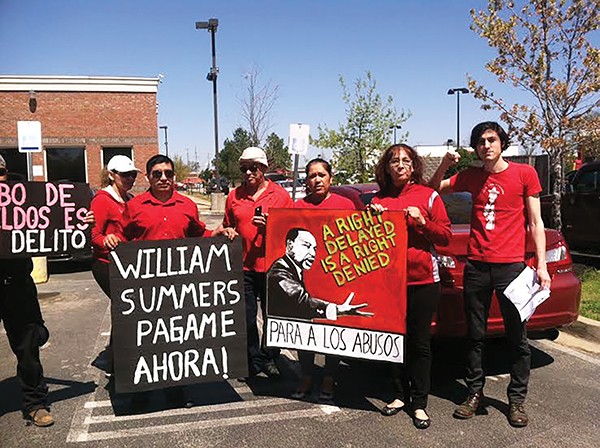A battle over unpaid wages started more than eight months ago at La Shish Café in Southwind, and it finally came to a head last weekend when a protest outside the café led to a resolution for three workers.
Last Saturday, more than 40 people stood in solidarity with three workers who were fighting for back wages owed to them by café owner William Summers. By the end of the demonstration, Summers made an effort to pay up.
Most of the money owed is for a remodel of the café that occurred last year. Angel said he is owed more than $17,000 for remodeling the restaurant, including the demolition of the previous restaurant. Jeff claimed he is owed more than $2,000 for laying tile. Jennifer cleaned the café and says she never received $450 for her services. All three workers’ last names have been withheld per their request.

Protesters fight wage theft at La Shish Café.
The trio came to the Workers Interfaith Network (WIN) Worker’s Center in January after attempts to negotiate with Summers themselves failed.
“We’ve set up meetings with him, trying to resolve it,” said Jeshua Schuster, an organizer with WIN. “Every meeting we’ve made with him has been canceled, moved back, or delayed.”
According to Schuster, the organization and Summers came to an agreement on a repayment plan so that he would not have to pay the entirety of the owed wages upfront. When the due date for the first payment hit, Summers asked for an extension. The extended due date was April 3rd, the Friday before the protest. Organizers said they repeatedly stressed to Summers that if he made the first payments for the plan, the action would be called off.
Summers failed to make those payments, and the protest went on as scheduled — with support from Memph15, Comunidades Unidas en Una Voz, and the Mid-South Peace and Justice Center.
“Finally, he wrote the checks while we were there. That was a pretty great moment,” Schuster said, adding that Summers paid $500 to Angel and $100 for Jennifer.
Summers said later that he was willing to commit to the payment plan.
“I’m not disputing that I owe them,” Summers said. “I feel that could’ve been handled a lot better. They’ve got to be careful how they go about doing things. If their concern was to help the workers, suppose their protest ran me out of business. Then how would the workers get the proceeds for the work they did here? The ultimate goal should be to see if we can resolve it through a payment plan, which is what I’m trying to do.”
Emilie Bowman, an organizing assistant for WIN, said that, while this action was a success, if the workers do not continue to see payments, more protests will be planned.
“It was really wonderful to see the workers’ actions have such an immediate effect,” she said. “We hope that [this] sent a message to Mr. Summers — that we do have the community on our side, and we will be back if he does not honor these payments.”
There’s no way currently to report wage theft in Tennessee. A county ordinance aimed at preventing wage theft failed in 2012. Owed wages can be sought in civil court, but organizations like WIN handle situations outside of court until it reaches a boiling point, when the group refers the worker to a lawyer.
“[This] happens to low-wage workers on a regular basis,” Schuster said. “[Wage theft] is something we have to actively fight against or else people are going to continue taking advantage of folks.”